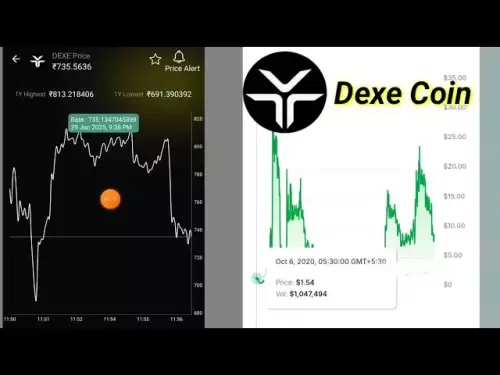-
 Bitcoin
Bitcoin $108,165.4587
0.78% -
 Ethereum
Ethereum $2,456.3517
1.15% -
 Tether USDt
Tether USDt $1.0003
0.00% -
 XRP
XRP $2.1934
0.05% -
 BNB
BNB $650.0935
0.52% -
 Solana
Solana $151.3905
2.69% -
 USDC
USDC $0.9998
0.00% -
 TRON
TRON $0.2751
-0.32% -
 Dogecoin
Dogecoin $0.1640
0.87% -
 Cardano
Cardano $0.5631
0.57% -
 Hyperliquid
Hyperliquid $38.7115
4.69% -
 Bitcoin Cash
Bitcoin Cash $493.1868
-0.39% -
 Sui
Sui $2.8217
3.61% -
 Chainlink
Chainlink $13.3994
2.08% -
 UNUS SED LEO
UNUS SED LEO $9.1632
0.94% -
 Avalanche
Avalanche $18.0318
1.97% -
 Stellar
Stellar $0.2388
0.35% -
 Toncoin
Toncoin $2.8763
1.41% -
 Shiba Inu
Shiba Inu $0.0...01160
1.59% -
 Litecoin
Litecoin $86.6393
1.29% -
 Hedera
Hedera $0.1485
0.16% -
 Monero
Monero $315.7948
1.56% -
 Polkadot
Polkadot $3.4240
1.88% -
 Bitget Token
Bitget Token $4.6314
-0.44% -
 Dai
Dai $0.9998
-0.01% -
 Ethena USDe
Ethena USDe $1.0002
-0.01% -
 Uniswap
Uniswap $7.2110
2.59% -
 Aave
Aave $270.6087
6.07% -
 Pi
Pi $0.5350
0.52% -
 Pepe
Pepe $0.0...09545
1.26%
Is real-name authentication for cryptocurrency wallets safe?
Real-name authentication enhances crypto wallet security but raises privacy concerns; users should choose platforms with robust security to mitigate risks.
Apr 03, 2025 at 09:43 am
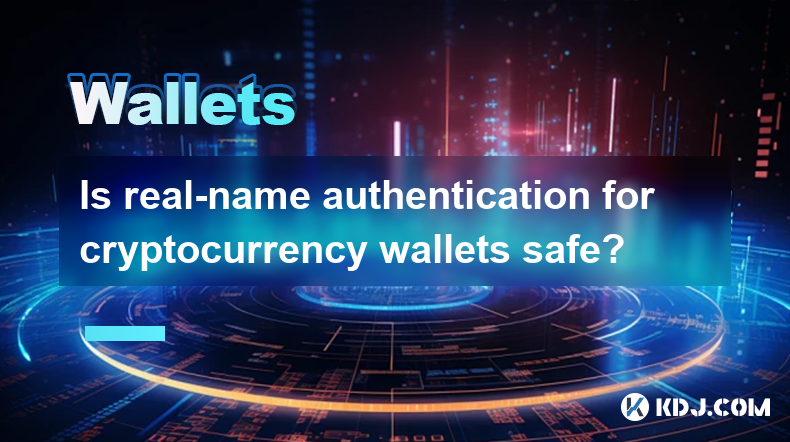
In the world of cryptocurrencies, the concept of real-name authentication for wallets has sparked a significant debate. As digital assets continue to gain mainstream acceptance, the need for enhanced security and regulatory compliance has led to the implementation of real-name authentication in many cryptocurrency platforms. This article delves into the safety aspects of real-name authentication for cryptocurrency wallets, exploring the potential benefits and risks associated with this practice.
Real-name authentication, also known as Know Your Customer (KYC) verification, involves users providing personal identification documents to prove their identity. This process is designed to prevent fraud, money laundering, and other illicit activities. While it may seem counterintuitive to the decentralized ethos of cryptocurrencies, real-name authentication has become a standard practice for many exchanges and wallet providers. The question remains: is this practice safe for users?
Benefits of Real-Name Authentication
One of the primary benefits of real-name authentication is enhanced security. By verifying the identity of users, platforms can better protect against unauthorized access and fraudulent activities. This can lead to a more secure environment for storing and transacting with cryptocurrencies. Additionally, real-name authentication can help in the recovery of lost or stolen funds, as platforms can more easily trace transactions back to verified individuals.
Another advantage is regulatory compliance. Many countries have implemented strict regulations on cryptocurrency transactions to combat money laundering and terrorist financing. Real-name authentication helps platforms adhere to these regulations, reducing the risk of legal repercussions. This compliance can also foster greater trust among users, as they know the platform is operating within the bounds of the law.
Real-name authentication can also contribute to the mainstream adoption of cryptocurrencies. By aligning with traditional financial systems, which often require identity verification, cryptocurrencies become more accessible to a broader audience. This can lead to increased legitimacy and acceptance of digital assets in the financial world.
Risks and Concerns
Despite the benefits, real-name authentication for cryptocurrency wallets comes with several risks and concerns. One of the primary concerns is privacy. Cryptocurrencies were initially designed to offer anonymity and financial freedom. Real-name authentication can compromise this anonymity, potentially exposing users to surveillance and data breaches.
Another risk is the potential for identity theft. If a platform's security is compromised, users' personal information could be stolen and used for malicious purposes. This is particularly concerning given the increasing frequency of cyberattacks targeting cryptocurrency platforms. Users must trust that the platforms they use have robust security measures in place to protect their sensitive data.
There is also the issue of centralization. Real-name authentication can lead to a more centralized control over cryptocurrency transactions, which goes against the decentralized nature of blockchain technology. This centralization can make the system more vulnerable to manipulation and control by authorities or large entities.
Safety Measures and Best Practices
To mitigate the risks associated with real-name authentication, users and platforms can adopt several safety measures and best practices. For users, it is crucial to choose reputable platforms with a strong track record of security and compliance. Researching the platform's security protocols, such as encryption and two-factor authentication, can help ensure that personal information is well-protected.
Users should also be cautious about the information they provide. Only share necessary information and avoid platforms that request excessive personal data. Additionally, using strong, unique passwords and enabling two-factor authentication can add an extra layer of security to your account.
For platforms, implementing robust security measures is essential. This includes using advanced encryption techniques, regularly updating security protocols, and conducting thorough audits to identify and address vulnerabilities. Platforms should also be transparent about their data handling practices and provide clear privacy policies to users.
The Role of Regulation
Regulation plays a significant role in the safety of real-name authentication for cryptocurrency wallets. Governments and regulatory bodies are increasingly focusing on the cryptocurrency space to ensure compliance with anti-money laundering (AML) and know your customer (KYC) regulations. While these regulations can enhance safety by reducing illicit activities, they also pose challenges for users and platforms.
Regulations can vary significantly from one jurisdiction to another, creating a complex landscape for cryptocurrency platforms to navigate. Platforms must ensure they comply with the regulations of the countries they operate in, which can be resource-intensive. For users, this means understanding the regulatory environment of the platforms they use and the potential implications for their privacy and security.
User Experience and Accessibility
The implementation of real-name authentication can impact the user experience and accessibility of cryptocurrency wallets. For some users, the requirement to provide personal information can be a barrier to entry, particularly for those who value privacy and anonymity. Platforms must balance the need for security and compliance with the need to provide a user-friendly experience.
To improve accessibility, platforms can offer clear instructions and support for the real-name authentication process. This can include step-by-step guides, responsive customer service, and user-friendly interfaces. Additionally, platforms can explore alternative verification methods that offer a balance between security and privacy, such as decentralized identity solutions.
Future Trends and Innovations
The future of real-name authentication for cryptocurrency wallets is likely to see continued evolution and innovation. As technology advances, new solutions may emerge that offer enhanced security and privacy. For example, zero-knowledge proofs and other cryptographic techniques could allow for identity verification without revealing sensitive personal information.
Blockchain technology itself may also play a role in improving the safety of real-name authentication. Decentralized identity systems built on blockchain can provide a more secure and private way to verify identities, reducing the reliance on centralized platforms. These innovations could help address some of the current concerns surrounding real-name authentication while maintaining the benefits of enhanced security and compliance.
Common Questions and Answers
Q: What is real-name authentication for cryptocurrency wallets?
A: Real-name authentication, or KYC verification, is the process of verifying a user's identity by requiring them to submit personal identification documents. This is done to comply with regulations and enhance security on cryptocurrency platforms.
Q: What are the benefits of real-name authentication?
A: The benefits include enhanced security, regulatory compliance, and increased mainstream adoption of cryptocurrencies. It helps prevent fraud and money laundering, and can aid in the recovery of lost or stolen funds.
Q: What are the risks associated with real-name authentication?
A: The risks include compromised privacy, potential for identity theft, and increased centralization of cryptocurrency transactions. Users must trust that platforms have robust security measures to protect their data.
Q: How can users ensure their safety when using real-name authentication?
A: Users should choose reputable platforms, research security protocols, use strong passwords, and enable two-factor authentication. They should also be cautious about the information they provide and only share what is necessary.
Q: How do regulations impact real-name authentication for cryptocurrency wallets?
A: Regulations aim to enhance safety by reducing illicit activities, but they can also create challenges for users and platforms. Platforms must comply with varying regulations across jurisdictions, which can be complex and resource-intensive.
Q: How does real-name authentication affect user experience and accessibility?
A: It can be a barrier to entry for some users, particularly those who value privacy. Platforms must balance security and compliance with user-friendly experiences, offering clear instructions and support for the authentication process.
Q: What future trends and innovations might impact real-name authentication?
A: Future trends may include the use of zero-knowledge proofs and decentralized identity systems built on blockchain. These innovations could enhance security and privacy, addressing current concerns while maintaining the benefits of real-name authentication.
Disclaimer:info@kdj.com
The information provided is not trading advice. kdj.com does not assume any responsibility for any investments made based on the information provided in this article. Cryptocurrencies are highly volatile and it is highly recommended that you invest with caution after thorough research!
If you believe that the content used on this website infringes your copyright, please contact us immediately (info@kdj.com) and we will delete it promptly.
- Cryptos, Web3, Growth: What's Hot in the Streets (and on the Blockchain) for 2025
- 2025-06-30 06:30:12
- XRPL Validator Vet Sets the Record Straight: XRP, Not Your Typical US-Based Crypto
- 2025-06-30 06:30:12
- BNB, Maxwell Fork, and BSC Mainnet: Navigating Speed, Stability, and Geopolitical Tides
- 2025-06-30 06:50:12
- Qubetics, Render, Cronos: The Altcoins Poised to Pop in the Next Bull Run
- 2025-06-30 06:54:04
- Web3 AI, Bitcoin Cash, and Cardano: Crypto's Rising Stars in 2025
- 2025-06-30 06:57:13
- Bitcoin, Exchanges, and Institutions: A New Era of Crypto Dynamics
- 2025-06-30 06:35:12
Related knowledge
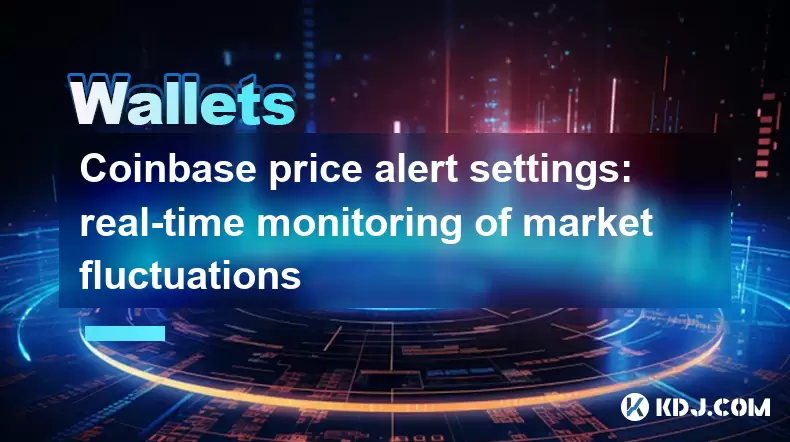
Coinbase price alert settings: real-time monitoring of market fluctuations
Jun 29,2025 at 07:00am
Setting Up Coinbase Price AlertsTo begin real-time monitoring of market fluctuations on Coinbase, users can utilize the built-in price alert feature. This function allows you to receive notifications when a cryptocurrency reaches a specific price point. To access this setting, open the Coinbase app or log in via the web platform. Navigate to the 'Prices...

How to stake cryptocurrencies on Coinbase? Benefits and risks
Jun 27,2025 at 06:36pm
Understanding Cryptocurrency Staking on CoinbaseStaking cryptocurrencies involves locking up digital assets to support the operations of a blockchain network, typically in return for rewards. Coinbase, one of the most popular cryptocurrency exchanges globally, offers staking services for several proof-of-stake (PoS) coins. Users can stake their holdings...
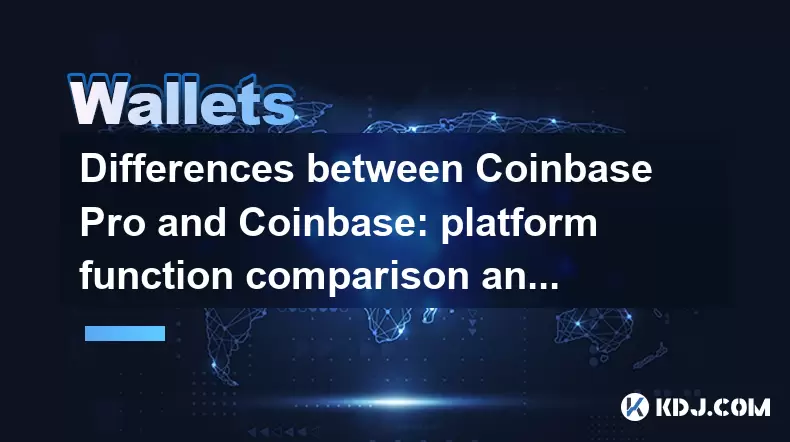
Differences between Coinbase Pro and Coinbase: platform function comparison and analysis
Jun 29,2025 at 08:21am
Overview of Coinbase and Coinbase ProWhen exploring the cryptocurrency trading landscape, users often encounter two platforms under the same parent company: Coinbase and Coinbase Pro. While both are operated by the same organization, they cater to different types of users and offer varying features. Coinbase is primarily designed for beginners and casua...
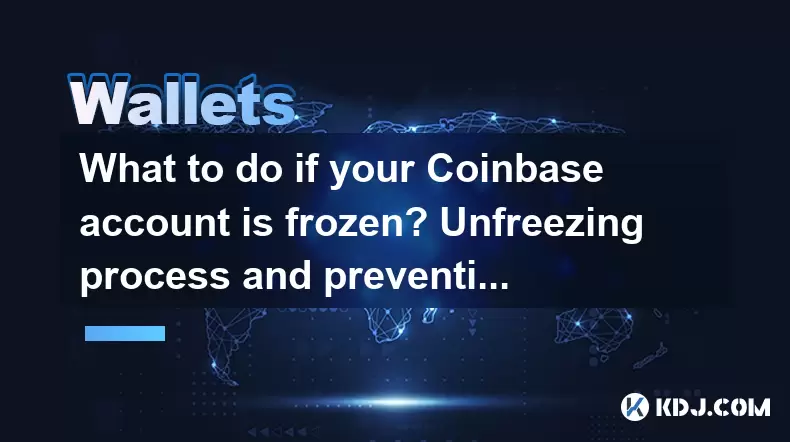
What to do if your Coinbase account is frozen? Unfreezing process and preventive measures
Jun 30,2025 at 03:49am
Understanding Why Your Coinbase Account Might Be FrozenIf your Coinbase account is frozen, it typically indicates that the platform has detected suspicious activity or potential violations of its terms of service. This could be due to a variety of reasons such as unusual login attempts, high-risk transactions, or incomplete verification steps. Coinbase ...

How to contact Coinbase customer service? Support channels and response times
Jun 28,2025 at 01:29pm
Contacting Coinbase Customer Service: Support Channels and Response TimesIf you're a user of Coinbase, reaching their customer service team may become necessary for various reasons, such as account verification issues, transaction disputes, or technical difficulties. Understanding the different support channels available and what to expect in terms of r...

Coinbase advanced trading function usage tutorial: limit orders and market orders
Jun 28,2025 at 09:07pm
Understanding the Difference Between Limit Orders and Market OrdersWhen using Coinbase's advanced trading features, it is crucial to understand the fundamental difference between limit orders and market orders. A market order executes immediately at the best available price on the market. This type of order ensures that your trade goes through quickly, ...

Coinbase price alert settings: real-time monitoring of market fluctuations
Jun 29,2025 at 07:00am
Setting Up Coinbase Price AlertsTo begin real-time monitoring of market fluctuations on Coinbase, users can utilize the built-in price alert feature. This function allows you to receive notifications when a cryptocurrency reaches a specific price point. To access this setting, open the Coinbase app or log in via the web platform. Navigate to the 'Prices...

How to stake cryptocurrencies on Coinbase? Benefits and risks
Jun 27,2025 at 06:36pm
Understanding Cryptocurrency Staking on CoinbaseStaking cryptocurrencies involves locking up digital assets to support the operations of a blockchain network, typically in return for rewards. Coinbase, one of the most popular cryptocurrency exchanges globally, offers staking services for several proof-of-stake (PoS) coins. Users can stake their holdings...

Differences between Coinbase Pro and Coinbase: platform function comparison and analysis
Jun 29,2025 at 08:21am
Overview of Coinbase and Coinbase ProWhen exploring the cryptocurrency trading landscape, users often encounter two platforms under the same parent company: Coinbase and Coinbase Pro. While both are operated by the same organization, they cater to different types of users and offer varying features. Coinbase is primarily designed for beginners and casua...

What to do if your Coinbase account is frozen? Unfreezing process and preventive measures
Jun 30,2025 at 03:49am
Understanding Why Your Coinbase Account Might Be FrozenIf your Coinbase account is frozen, it typically indicates that the platform has detected suspicious activity or potential violations of its terms of service. This could be due to a variety of reasons such as unusual login attempts, high-risk transactions, or incomplete verification steps. Coinbase ...

How to contact Coinbase customer service? Support channels and response times
Jun 28,2025 at 01:29pm
Contacting Coinbase Customer Service: Support Channels and Response TimesIf you're a user of Coinbase, reaching their customer service team may become necessary for various reasons, such as account verification issues, transaction disputes, or technical difficulties. Understanding the different support channels available and what to expect in terms of r...

Coinbase advanced trading function usage tutorial: limit orders and market orders
Jun 28,2025 at 09:07pm
Understanding the Difference Between Limit Orders and Market OrdersWhen using Coinbase's advanced trading features, it is crucial to understand the fundamental difference between limit orders and market orders. A market order executes immediately at the best available price on the market. This type of order ensures that your trade goes through quickly, ...
See all articles





















